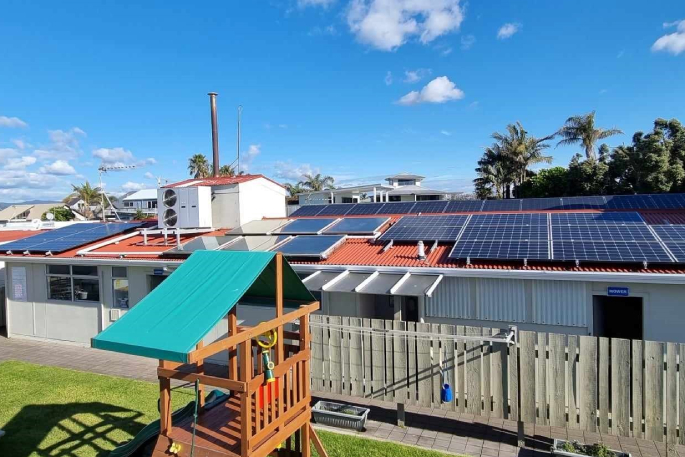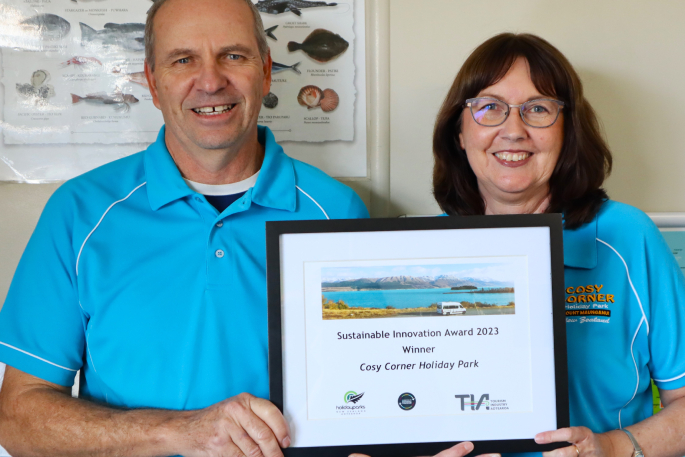A holiday park in Mt Maunganui, which began its sustainability journey decades ago, has won one of its industry’s top awards.
Cosy Corner Holiday Park was recently crowned the winner of this year’s Tourism Industry Aotearoa Sustainable Innovation Award at the Holiday Parks NZ Awards evening.
Long before sustainability became a catchphrase, Cosy Corner was finding ways to conserve precious resources. Ted and Mavis Davidson bought the park in 1968 and were quick to start innovations.
On the roof, solar panels made by Ted in the 1980s still pre-heat the hot water, and more solar panels warm the swimming pool. A PV solar system and heat pump have recently replaced the diesel burner water heater, keeping hot water costs neutral.
Water is conserved with a water bore for irrigation, and flow-restrictors in the showers.
The park’s waste is minimised with recycling facilities, a food waste collection service and plastic minimisation. They stopped using bin liners five years ago.
Many of these sustainability measures were brought in by the current park owners, Greg Davidson (Ted’s son) and his partner Vicki Woodcraft, showing that many small steps can collectively make a big difference.
“We’re only a small holiday park but we believe that everyone doing their bit will collectively make a difference for future generations.
“Our staff and guests have shown great commitment to help us too, with some even changing their waste habits when they’re back home.”
Situated across the road from Omanu beach, Cosy Corner amped up its sustainability journey in 2018 when the couple signed the Tourism Sustainability Commitment, the tourism industry’s key environmental goalpost.
Greg and Vicki then went to the next level last year when they joined a sustainability programme called The Green Room - Te Rūma Kākāriki.
The programme is delivered by Tourism Industry Aotearoa, managed by Tourism Bay of Plenty, and funded by Bay of Plenty Regional Council Toi Moana.
“We were keen to calculate our carbon emissions but had never quite understood how to do that,” says Greg.
“Landfill waste was the highest portion (one third) of our emissions, even though we had already hugely reduced our waste.”
So, over the summer the couple took a laser-like focus to their waste. They improved signage at their landfill and recycling station, added bins for food waste in the units, and removed rubbish bins from the park kitchen to drive people to dispose more mindfully.
They also put a container at their recycling station for bottle caps, lids and can tabs, took soft plastics to their supermarket collection site, and polystyrene packaging to Expol.
Better still, they sought suppliers that did not use plastic packaging.
The park sells its empty bulk cleaning containers for a nominal sum and gives the proceeds to charity.
Naturally, guests at the park are encouraged to refill their water bottles and plastic bottled drinks are not sold there.
 Solar panels at Cosy Corner are a key source of heating, some dating back to Greg’s father Ted’s can-do attitude.
Solar panels at Cosy Corner are a key source of heating, some dating back to Greg’s father Ted’s can-do attitude.
All these actions started adding up. Between January and April this year, the park diverted on average 72 per cent of its waste, including food, well up from the 40 per cent it was averaging in 2019.
“Waste disposal costs are a large portion of Holiday Parks expenses, and as we found out they are also a large part of our carbon footprint,” Greg notes.
Recognising that being a good tourism operator involves being a good citizen, the park has also undertaken many community activities including charity quiz nights and community volunteering. Staff have twice taken part in their local Mount Everest fundraiser.
During the Hawkes Bay flood last summer, the park and their guests also donated food and toiletries for distribution to affected areas.
All of these efforts were recognised by the judges of the TIA award, who particularly noted Cosy Corner’s waste diversion and education efforts - moves that were “good for both reducing this spending line and reducing carbon”.
Others are now looking to Cosy Corner as an example of what can be done, a fact that thrills Greg and Vicki.
Gisela Purcell, one of TIA’s sustainability and member advocates, says Cosy Corner’s story is inspiring both to their guests and to other operators.
“I think they’ve done an exceptional job around recycling and waste management as well as their use of solar panels and we are so impressed we are using them as an example to others in our programme.”
Stacey Linton, Head of Strategy and Insights at Tourism Bay of Plenty, says The Green Room caters for businesses and organisations which are ready to make their first steps towards a more sustainable future.
However, the action plans that each participant co-develops can also help businesses like Cosy Corner which have already started their sustainability journey.
“Sixty-nine businesses and organisations from throughout our coastal region have completed or are part-way through the 12-week programme, and we’ve been grateful for Greg and Vicki’s willingness to share their knowledge and tips with other participants,” says Stacey.
“They’ve been an inspiring example - that there’s always more that we can all do in the environmental sustainability space.”
The Green Room programme has environmental sustainability at its core, but also covers financial sustainability, business resilience, and social sustainability.
The programme is free and registrations for the final intake of the year are open, starting later in August.
More easy steps towards sustainability from Cosy Corner:
- Providing unwrapped guest soaps in units and sending leftover soap to Beyond Skin Deep for recycling
- Using pillows made from recycled plastic bottles and selling reusable coffee cups.
- Making available fabric shopping bags (made by staff) for guests to use.
- Supporting predator control by sponsoring traps at the nearby Mauao historic reserve, the Mount’s sacred mountain.



0 comments
Leave a Comment
You must be logged in to make a comment.